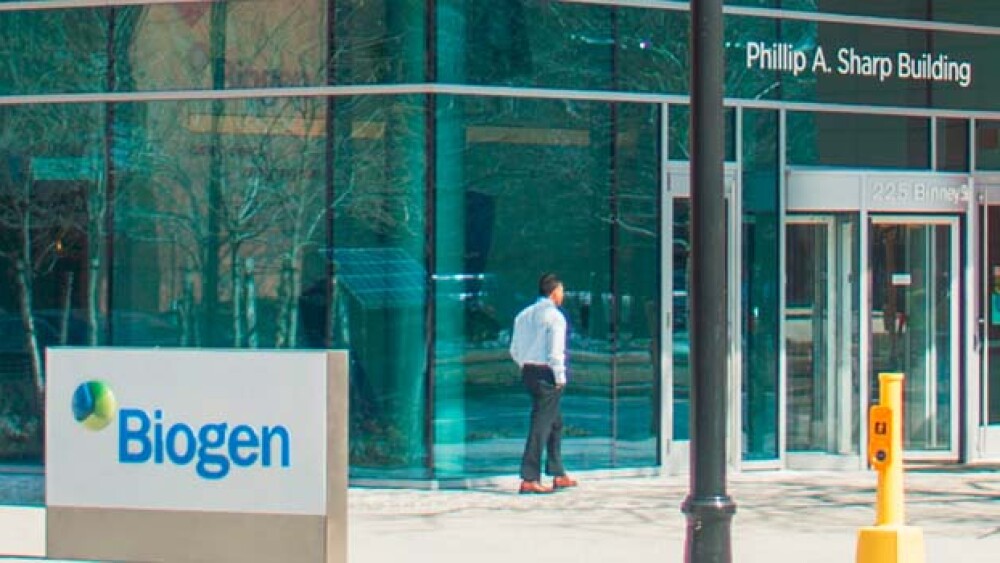Many analysts and investors were holding their breaths, waiting to see what Biogen would say at yesterday’s second-quarter financial report. The financials weren’t the focus, however, but what the Cambridge, Massachusetts biotech had to say about its pipeline, especially for Alzheimer’s disease, was.
Many analysts and investors were holding their breaths, waiting to see what Biogen would say at yesterday’s second-quarter financial report. The financials weren’t the focus, however, but what the Cambridge, Massachusetts biotech had to say about its pipeline, especially for Alzheimer’s disease, was.
For example, Geoffrey Porges, an analyst with Leerink, told investors a week ago to prepare for a “wild ride,” noting, “We are hesitant to recommend Biogen’s stock ahead of the upcoming data.”
The biggest focus was on Biogen’s BAN2401, said Salim Syed, an analyst with Mizuho, and what the size of its effect on the Alzheimer’s Disease Composite Score (ADCOMS) in the clinical trial would be. He suggested that a 15 percent benefit would be “fundamentally good,” although investors might want to see 20 percent.
And with the Alzheimer’s Association International Conference (AAIC) 2018 ongoing in Chicago this week, investors have had their attention split between Chicago and Cambridge as they search their crystal balls for clues to what’s going on with Biogen.
From a financial point of view, the company’s second quarter looked pretty good. Biogen reported strong sales for the second quarter, with total revenues of $3.4 billion, up 9 percent compared to the same period in 2017. Multiple sclerosis (MS) revenues were $2.3 billion, with about $113 million being royalties for Ocrevus. Its relatively new drug for spinal muscular atrophy (SMA), Spinraza, brought in $423 million in global revenues for the quarter.
Both GAAP net income and diluted earnings per share (EPS) were up compared to the second quarter in 2017, with GAAP net income being $867 million compared to $863 million in 2017, and EPS being $4.18 this year compared to $4.07 in the second quarter of 2017.
Total revenues for the second quarter were $3.357 million compared to $3.078 billion in the second quarter of 2017.
The company also indicated that it and Eisai Co. will move ahead with late-stage clinical trials of BAN2401 for Alzheimer’s disease. They are working with regulators to design the studies and try to get Breakthrough Therapy designation or its global equivalents.
On July 6, the two companies announced positive topline results from their Phase II trial of BAN2401 in Alzheimer’s. It failed its primary goal at the 12-month mark, not showing better results than placebo. But the announcement looked at 18 months of data, and positive effects were observed in one of five doses—the highest one. It appeared to have a significant positive response on both cognition and accumulation of amyloid plaques in the brain.
Lynn Kramer, Eisai’s chief medical officer of its neurology unit told Reuters yesterday, “Our plan would be to start more trials. Whether it be Phase III in the same patient population, or other populations. We are thinking about a number of things. We are certainly considering ‘prime’ status in Europe, ‘breakthrough’ in the United States and ‘sakigake’ in Japan.”
Biogen also announced yesterday that it had acquired Phase Ia and preclinical assets from AliveGen. They are BIIB110 and ALG0802, respectively, and target the myostatin pathway. They expect to develop them in multiple neuromuscular indications, including SMA and amyotrophic lateral sclerosis. This included an upfront payment of $27.5 million and up to $535 million in potential milestones.
So did the news make investors happy? Sumant Kulkarni, an analyst with Cannacord Genuity wrote in a note to investors, “With 2Q earnings out of the way, the focus is now squarely back on BAN2401 (monoclonal antibody for Alzheimer’s disease, AD) Phase II data, which partner Eisai will be presenting at the Alzheimer’s Association International Conference (AAIC) tomorrow (7/25) in Chicago, IL. As we have noted, we like the risk-reward on BIIB shares going into this event, which we are attending, and are reiterating our BUY rating on the shares.”
The results of the BAN2401 study indicated that in terms of the accumulation of amyloid in the brain at 18 months as measured by PET via quantitative evaluation of Standard Uptake Value Ratio (SUVr), a statistically significant decrease in brain amyloid load compared to placebo was observed in the arm of the study receiving 50 mg of the drug. The clinical efficacy evaluated using the Clinical Dementia Rating Sum of Boxes (CDR-SB) rating scale was fuzzier. There was a mean treatment difference of -0.5 based of an increase of 1.1 for those on the 50 mg total group arm of 29 patients compared to an increase of 1.6 for the 12 patients receiving placebo. Biogen stated, “This represented a 31 percent slowing in rate of decline for the elenbecestat arm which is potentially considered to be clinically important.”
More details will be forthcoming as the conference wraps up.





